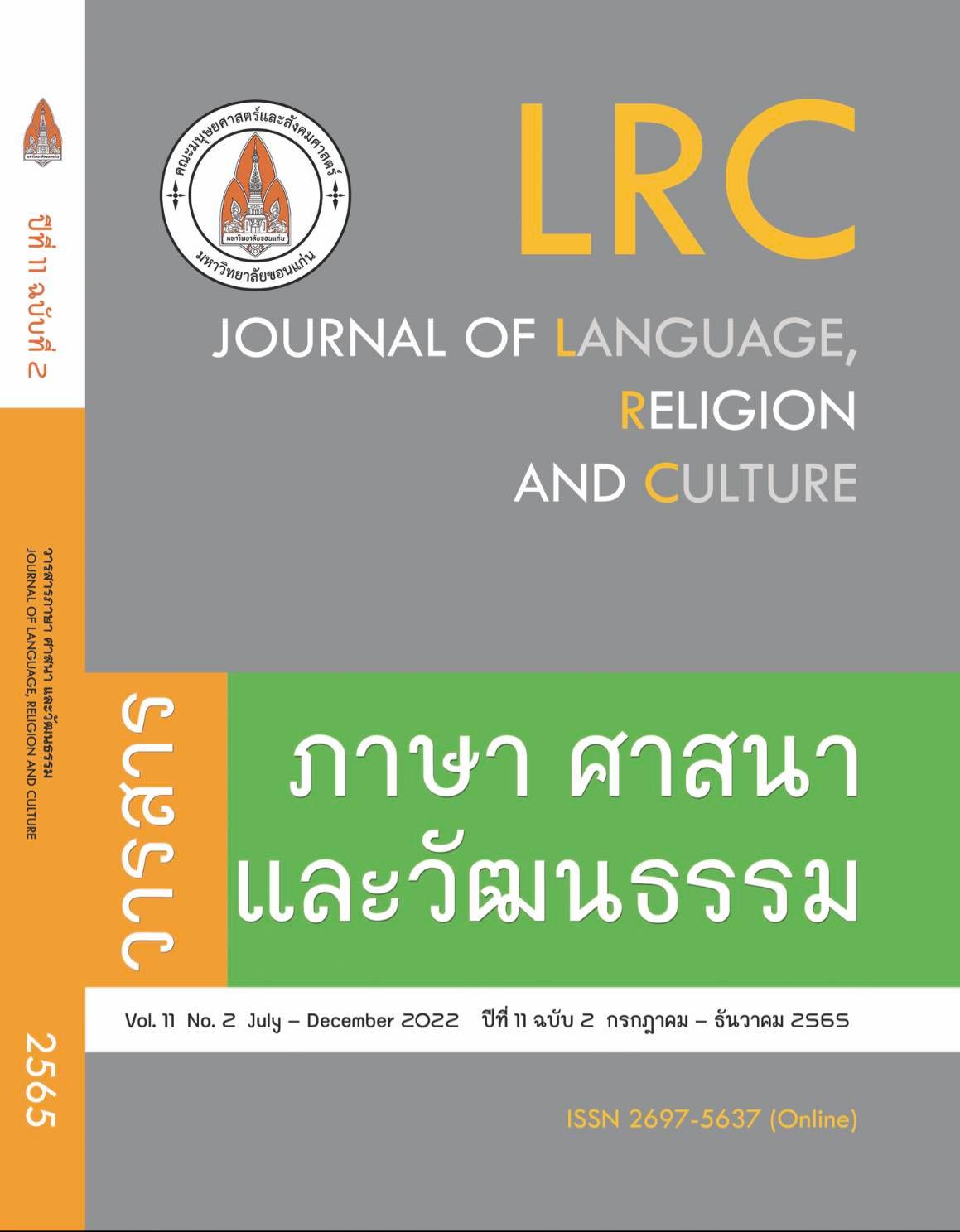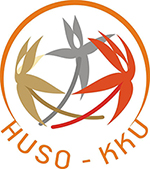ชีวประวัติและคุณูปการของพระธรรมรัตนะในคัมภีร์เกาเซิงจ้วนแปล : พระภิกษุชาวต่างชาติยุคราชวงศ์ฮั่น
ชีวประวัติและคุณูปการของพระธรรมรัตนะในคัมภีร์เกาเซิงจ้วนแปล : พระภิกษุชาวต่างชาติยุคราชวงศ์ฮั่น
คำสำคัญ:
เกาเซิงจ้วน, พระธรรมรัตนะ, พระภิกษุชาวต่างชาติ, ยุคราชวงศ์ฮั่นบทคัดย่อ
บทความนี้มีวัตถุประสงค์เพื่อ 1) นำเสนอบทถอดความชีวประวัติของพระธรรมรัตนะในคัมภีร์
เกาเซิงจ้วน 2) วิเคราะห์รายละเอียดของเหตุการณ์ทางประวัติศาสตร์ คัมภีร์และภาพวาดพระพุทธรูปในชีวประวัติของพระธรรมรัตนะ 3) วิเคราะห์คุณูปการของพระธรรมรัตนะที่มีต่อพระพุทธศาสนาจีน โดยใช้วิธีวิจัยเชิงคุณภาพ การถอดความ และการวิเคราะห์ข้อมูลจากหลักฐานบันทึกโบราณของจีน เช่น คัมภีร์
เกาเซิงจ้วน บันทึกประวัติศาสตร์ราชวงศ์ฮั่นตะวันออก คัมภีร์โซวเสินจี้ คัมภีร์เว่ยซู เป็นต้น รวมถึงงานวิจัยต่าง ๆ ที่เกี่ยวข้องทั้งภาษาจีนและต่างประเทศ
ผลการศึกษาพบว่า รายละเอียดเนื้อหาชีวประวัติของพระธรรมรัตนะที่หลงเหลือในปัจจุบัน มีปรากฏอยู่ในคัมภีร์เกาเซิงจ้วนเท่านั้น ไม่มีอยู่ในบันทึกร่วมสมัยฉบับอื่น ๆ ชีวประวัติของพระธรรมรัตนะมีความเกี่ยวข้องกับเหตุการณ์จลาจล การขุดทะเลสาบคุนหมิงในยุคราชวงศ์ฮั่น และจากการบันทึกของท่านฮุ่ยเจี่ยว ผู้รจนาคัมภีร์เกาเซิงจ้วน ทำให้ทราบว่าคัมภีร์แปลสำคัญซึ่งถือเป็นคัมภีร์พระพุทธศาสนายุคแรกและภาพวาดพระพุทธรูปที่ถูกนำกลับมา พร้อมคณะทูตของจักรพรรดิฮั่นหมิง ได้สูญหายไปตั้งแต่ก่อนยุคจิ้นตะวันออกแล้ว นอกจากนี้ จากการศึกษาผลงานการแปลคัมภีร์ และการทำงานเผยแผ่ของพระธรรมรัตนะ ทำให้เห็นถึงคุณธรรมของท่าน ในด้านของความมุ่งมั่น อดทน การยอมละทิ้งเกียรติยศ เพื่ออุทิศให้กับงานการเผยแผ่พระพุทธศาสนาในจีนอย่างเต็มที่ โดยผลงานที่โดดเด่นที่สุดของท่าน อาจกล่าวได้ว่าเป็นการวางรากฐานการแปลคัมภีร์พระพุทธศาสนาเป็นภาษาจีน ที่มีความสำคัญต่อการปักหลักพระพุทธศาสนาให้มั่นคงในแผ่นดินจีนสืบมาอีกนานนับพันปี
เอกสารอ้างอิง
พระมหาอานนท์ อานนฺโท. (2564). คัมภีร์ 42 บท ปฐมคัมภีร์พระพุทธศาสนาพากย์จีน. กรุงเทพฯ : ศูนย์การแปลคัมภีร์พระพุทธศาสตร์ ไทย-จีน มูลนิธิพุทธรังษี.
มหาวิทยาลัยมหามกุฏราชวิทยาลัย. (2552). พระไตรปิฎกและอรรถกถาแปล เล่ม 1. นครปฐม: โรงพิมพ์มหามกุฏราชวิทยาลัย.
เมธี พิทักษ์ธีระธรรม, ปิยาภรณ์ ว่องวรางกูร, พรพิมล ศรีหมอก. (2563). ชีวประวัติพระคังเซิงฮุ่ย ในคัมภีร์เกาเซิงจ้วนแปล (1): การอัญเชิญพระบรมสารีริกธาตุของพระคังเซิงฮุ่ย ในรัชสมัยพระเจ้าซุนกวน ยุคสามก๊ก. วารสารพุทธศาสน์ศึกษา จุฬาลงกรณ์มหาวิทยาลัย 27(2), 104-138.
วิไลพร สุจริตธรรมกุล และคณะ. (2565) รายงานการวิจัยเรื่อง “การถอดความและการศึกษาวิเคราะห์ชีวประวัติพระสมณะบนเส้นทางสายไหม: กรณีศึกษาคัมภีร์เกาเซิงจ้วนในหมวดพระผู้แปลคัมภีร์พระพุทธศาสนาตั้งแต่ยุคราชวงศ์ฮั่นถึงราชวงศ์เว่ย.”
Baidubaike. (2022, Sep 23). Retrieved from https://baike.baidu.com/item/%E7%A B%BA%E6%B3%95%E5%85%B0%E5%A2%93/16854169
de Crespigny, R. (2007). A Biographical Dictionary of Later Han to the Three Kingdoms (23-220 AD). Leiden: Brill.
. (2017). Fire over Luoyang: A History of the Later Han Dynasty (23-220 AD). Leiden: Brill.
Diglweb. (2022, Sep 23). Zhongguo simiao ciguan zaoxiang shujuku [Database of China Temple Statue].” Retrieved from http://diglw eb.zjlib.cn:8081/ zjtsg/zgsmcgzx/cypicgl.jsp?channelid=91743&searchword=%CF%F1%D6%F7%B1%E0%BA%C5=756
Gao, J.P. (2012). Shilun longmen shiku Youtianwang zaoxiang [On the Udayana King Images of the Longmen Grottoes]. Sichou zhi lu, 227, 10, 28-40.
Gao, Q. (2021). Donghan zhi Tangdai chuan fojiao sengren minghao de yanbian [The Evolution of the Names of Han Buddhist Monks from the Eastern Han Dynasty to the Tang Dynasty]. Foxue yanjiu, 146, 1, 45-53.
Fang, L. (2001). Zhongguo fojiao jian shi [A Brief History of Chinese Buddhism]. Beijing: Zongjiao wenhua chubanshe.
Fu, H.S. (2014). On the historical classicality of the translated version of the Sutra in Forty-two Sections. Huadong shifan daxue xuebao (zhexue shehui kexue ban), 6, 73-151.
Hamada, T. (2006). On the Udayana King Images in the Vicinity of Early Tang Luoyang. Ars Buddhica, 287, 1-5.
. (2014). Buddha Image described as "King Udayana Image". Object Narrative. In Conversations: An Online Journal of the Center for the Study of Material and Visual Cultures of Religion.
Han Shu/6.15a. (n.d.). Retrieved from http://www.guoxue.com/shibu/24shi/ hansu/hsuml.htm
Hou Han Shu/64, 65. (n.d.). Retrieved from https://zh.wikisource.org/wiki/%E5% BE%8C%E6%BC%A2%E6%9B%B8_(%E5%9B%9B%E5% BA%AB%E5%85%A8%E6%9B%B8%E6%9C%AC)/%E5%8D%B7060%E4%B8%8B)
Li, W.S. (1985). Woguo shiku Zhong de Youtianwang zaoxiang—longmen shiku de Youtianwang zaoxiang zhi zao zhiduo wei quanguo zhi zui [On the Udayana King Images in China's Grottoes: the earliest Udayana King Images at the most well-known cave in China]. Zhongyuan wenwu, 4, 102-106.
Li, Y.Z. (1996). Hanmingdi wu fo dao jueli shi—Fo Dao jiaoshe shi lun yao [The misapprehension on the debates between Buddhist and Taoism in the Emperor Ming of Han in the Fo Dao jiaoshe shi lun yao]. Daojiao huatan, 8-12.
Maspero, H. (1910). Le songe et l’ambassade de l’empereur Ming: Étude critique des sources. Bulletin de l'École française d'Extrême-Orient, vol.10, no.1, 95–130.
San Guo Zhi/30. (n.d.). Retrieved from https://zh.wikisource.org/wiki /%E4%B8%89% E5%9C%8B%E5%BF%97/%E5%8D%B730
Shou Shen Ji/13. (n.d.). Retrieved from http://guoxue.httpcn.com/html/book/MEP WMEIL/CQTBRNXVKOUY.shtml
Taisho Tripitaka Publication Association. (1962). Taisho shinshu daizokyo [Taisho Revised Tripiṭaka]. Tokyo: Taisho Issaikyo kankokai.
Tang, Y.T. (1938). Han Wei liang Jin Nan Beichao fojiao shi [History of Buddhism in the Han, Wei, two Jins dynasties, Northern and Southern dynasties] Beijing: Zhonghua shuju.
. (2008). Han Wei liang Jin Nan Beichao fojiao shi [History of Buddhism in the Han, Wei, two Jins dynasties, Northern and Southern dynasties]. Wuhan: Wuhan daxeu chubanshe.
Tong, C. (1992). “Dongzhuo” Zhongguo lishi [Dongzhuo in the Chinese history]. Beijing/ Shanghai: Zhongguo dabaikequanshu chubanshe.
Tsukamoto, Z.R. (1985). A History of Early Chinese Buddhism: From Its Introduction to the Death of Hui-yuan. Leon Hurvitz, L. (Trans.). Tokyo: Kodansha International.
Wang, G.X. (2017). Luoyang Baimasi xiujian shi zha [The history of the construction of the White Horse Temple in Luoyang]. Zhongguo jianzhu shi lun huikan, 2, 49-82.
Wei Shu/114. (n.d.). Retrieved from https://zh.wikisource.org/wiki/%E9%AD%8F% E6%9B%B8_(%E5%9B%9B%E5%BA%AB%E5%85%A8%E6%9B%B8%E6%9C%AC)/%E5%8D%B7114)
Yang, W.Z. (2016). A New Study on the Sutra in Forty-two Sections. Fojiao yanjiu, 2, 83-89.
Zhao, S.S. (2019). Protection of the Dharma in “Daoxuan’s Continued Biographies of Eminent Monks”. McMaster University.
Zhen, Z. (2001). Zhongguo di yi gucha—Luoyang Baimasi [On the first ancient temple in China, the Luoyang White Horse Temple]. Baike zhishi, 6, 62-63.
Zürcher, E. (1959). The Buddhist Conquest of China. Reprint (2007). Leiden: E.J. Brill.
ดาวน์โหลด
เผยแพร่แล้ว
รูปแบบการอ้างอิง
ฉบับ
ประเภทบทความ
สัญญาอนุญาต
ลิขสิทธิ์ (c) 2022 วารสารภาษา ศาสนา และวัฒนธรรม

อนุญาตภายใต้เงื่อนไข Creative Commons Attribution-NonCommercial-NoDerivatives 4.0 International License.







